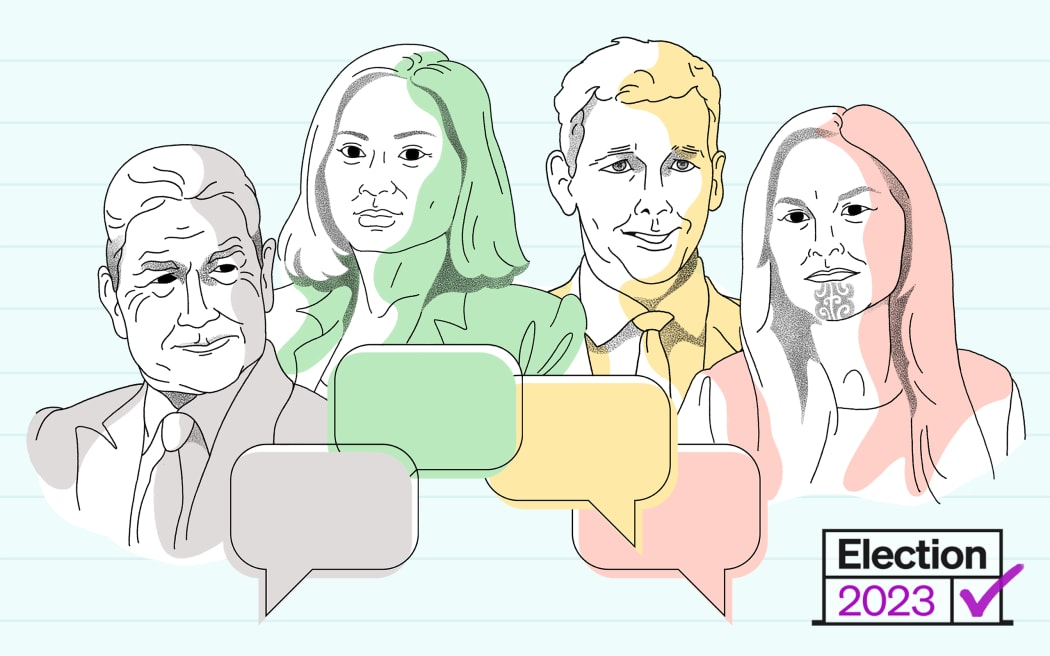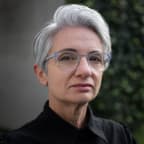
Photo: RNZ
The Newshub Nation Powerbrokers' Debate on Thursday night saw fiery exchanges between leaders of four minor parties.
ACT's David Seymour and NZ First's Winston Peters traded insults. Green co-leader Marama Davidson and Te Pati Māori's co-leader Debbie Ngarewa-Packer performed what was described as a "double act", which included a high-five.
The insults started early, when host Rebecca Wright asked Seymour if he was race-baiting. "He's not baiting, he's imitating," quipped Peters.
Seymour later expressed distrust of Peters' value in a coalition government. "It's like an arsonist showing up dressed as a fireman saying 'I'm here to help and fix it all for you'," he said.
Davidson questioned whether the pair would be too unruly for the National leader to wrangle. "Do people actually trust that [Christopher] Luxon is going to be able to manage these two, for real?"
She then turned to Ngarewa-Packer and said: "We can be friends, aye?"
Commentators Jenna Lynch and Simon Wilson thought Davidson's performance was the strongest of the leaders. Alongside Fran O'Sullivan, the three agreed while Seymour appeared to speak a lot, he lacked impact. "He was going round and round in circles," said Lynch, who thought Seymour lost the crowd.
Who talked the most?
RNZ's data analysis on the number of discernable words spoken during the debate put Peters and Seymour well ahead of Davidson and Ngarewa-Packer.
The NZ First leader said 1624 discernable words during the debate, accounting for 23 percent of the words spoken. Seymour was right behind at 22 percent. Davidson (14 percent) and Ngarewa-Packer (13 percent) were in a bracket of their own, well behind their two male counterparts.
Peters' 23 percent matched his performance in Newshub's 2020 debate, where he also spoke the most of all the leaders, saying 23 percent of the words. Davidson, who spoke the least in 2020, also matched her percentage of 14 percent. Te Pati Māori's Debbie Ngarewa-Packer spoke 13 percent, compared to John Tamihere's 19 percent in 2020. ACT's Seymour, who tied with Tamihere in second place in 2020, was the only leader to increase his score.
Debate moderator, Rebecca Wright, spoke 28 percent of all words, slightly more than 2020's moderator Simon Shepherd.
Seymour gave the longest uninterrupted answer to a question, saying 212 words to defend ACT's plan to spend $1 billion to increase prison beds.
The longest answer in 2020 was from Peters, who gave a 253 word answer related to the Covid-19 response, which included his hope for a vaccine. "Well, the fact is, we're praying for a vaccine every darn day." During this election campaign Peters has promised compensation to people who lost their jobs due to vaccine mandates, and those who have been injured by the vaccine.
What was said
The word "people" featured in the top 10 words used by all the leaders. It was both Seymour and Peters' top word and ranked third for Davidson and Ngarewa-Packer.
RNZ counted how many times each leader used certain words which relate to key topics. The most mentioned keyword was "crime", followed by "Māori" and "tax". These largely followed the questions posed by Wright to the participants. Education did not feature as a topic in the debate, but Seymour mentioned "school" five times.
Dodging the hard questions
A common tactic to avoid answering a question is to use what's referred to as a 'block and bridge'. The politician acknowledges the question using a 'block' and then uses a 'bridge' phrase to move the topic to something they are more comfortable with.
Peters used the most bridge terms of the leaders, with a total of four. Davidson did not use any.
What was the vibe?
According to a language sentiment data dictionary, which rates words as either positive, neutral or negative, Seymour used the highest percentage of positive words, followed by Davidson.
The most negative of the participants was Davidson, with 4.6 percent of her words classed as negative.
This differed from 2020, where Davidson led with positive language, scoring 6.6 percent. She also used the fewest negative words, just 0.9 percent. Tamihere used the highest percentage of negative words in that debate - 3.1 percent.
How we analysed the data: The debate was transcribed by Otter.ai and then manually cleaned to improve accuracy. Cross talk - where debate participants spoke over each other was removed where words were unintelligible. Interjections when intelligible were included. Text was analysed using R and the Quanteda package.


